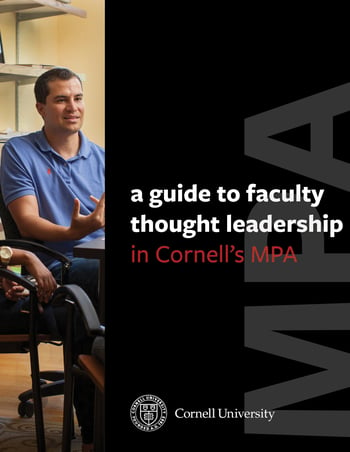Researching the Economics of Risky Health Behaviors with an MPA Faculty Member

John Cawley is a Professor in both the Department of Policy Analysis and Management and the Department of Economics. He is also co-Director of Cornell's Institute on Health Economics, Health Behaviors and Disparities. His research focuses on the economics of risky health behaviors.
John Cawley, a CIPA professor who teaches courses within the Social Policy concentration, shares his recent research projects, his advice on returning to school for an advanced degree, his current work in domestic policy, and his thoughts on the value of getting an MPA at the Cornell Institute for Public Affairs.
What is your background and how has it prepared you to be a part of the CIPA MPA program?
I’m an economist who studies the economics of risky health behaviors, in particular the economics of obesity. I’m honored to have been teaching at Cornell for 18 years; it’s a wonderful place to interact with fantastic students and top scholars. I study the effects of policies such as soda taxes, physical education in schools, public health insurance, and financial incentives for healthy behaviors.
In the course of that research, I’ve co-authored peer-reviewed journal articles with people at the National Institutes of Health, Centers for Disease Control and Prevention, World Bank, World Health Organization, and the White House “nudge unit.” Likewise, I value the real-world experience that CIPA fellows bring to the classroom.

What specific course do you teach for CIPA students? How does the course fit into the MPA curriculum?
I’m currently teaching a course on the Economics of Risky Health Behaviors, which fits in the Social Policy concentration. In that course, we study how people make decisions regarding alcohol, drugs, cigarettes, food, exercise, and suicide. Students read journal articles and analyze data, helping to make the transition from being a consumer of research to a producer of research. The course also features breakout sessions in which students debate specific policies such as the minimum legal drinking age, recreational marijuana laws, legalized prostitution, drug testing of welfare recipients, and assisted suicide. I’ve had great CIPA students in this course, and I welcome more!
What do you enjoy most about working with the CIPA program/with CIPA students?
I appreciate the CIPA students’ maturity, sincere desire to understand, diverse backgrounds, and the richness of their real-world experiences. These are not only enjoyable in one-on-one conversations, but enrich the classroom experience for everyone.
What advice do you have for someone who is considering the pros and cons of returning to school to pursue an MPA degree?
Getting an MPA is a good choice if you want to put yourself on a higher career trajectory and if you value building comprehensive skills in economic analysis, quantitative analysis, political and policy processes, as well as subject matter expertise in an area such as social policy, social justice, international development, or nonprofit management. In the process, you’ll also gain valuable real-world experience through your summer internship, hone your professional skills, and develop a lifelong network.
What research projects are you currently involved with?
A major project that I’m currently immersed in is studying the effects of city-level soda taxes in the U.S. The first of these only began in 2015, so it’s a very new area and virtually nothing was known about their potential effects. From the beginning, we’ve been collecting original data on the ground in these cities – collecting by hand – data on prices from a vast number of stores, and surveying consumers about their purchases and consumption. In studying these taxes in Berkeley, CA; Philadelphia, PA; Boulder, CO and other cities, we’ve found that the effects are complex and vary by city. The pass-through of the taxes (their impact on retail prices) varies from less than half of the tax in Berkeley to the full amount of the tax in Philadelphia. Such taxes lead consumers to increasingly cross-border shop outside the taxing city. In response to the tax, consumption of soda fell among adults in Philadelphia, but there was no detectable impact on the consumption of children. We have more data coming in from Oakland and other locations, so stay tuned!
Is there anything else you would like prospective students to know about you or the program?
Cornell has a vast number of faculty who are interested in public domestic policy and political affairs and are dedicated to teaching and mentoring. If you want to improve your understanding of economic and political theory, improve your quantitative skills, and develop subject matter expertise, come join us to begin the next stage of your career and life!
If you have questions about attending Cornell University's Institute for Public Affairs, we encourage you to request more information today!



